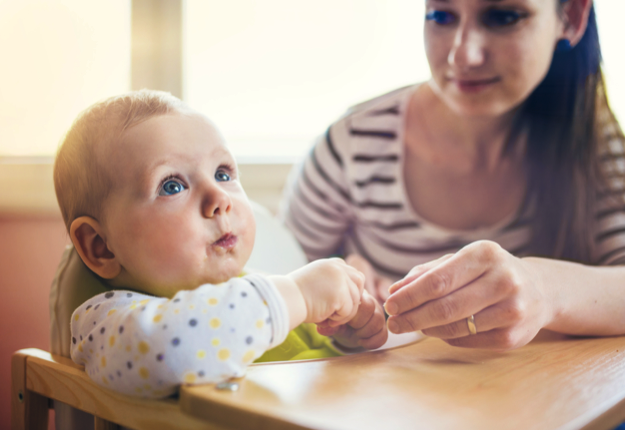What do you need to know about food allergy when you start solids for your baby?
Should you worry?
Some babies will develop allergies to food. Those that come from a family with a history of allergies (of any kind) tend to be at highest risk. However children with no family history of allergy may also develop food allergies.
Good first feeding practices
When starting solids for your baby, introduce a new food every 2-3 days and introduce new foods one at a time so any reactions can be clearly seen. In the event of a food reaction, avoid further contact with the food and seek the advice of your doctor.
The culprits
It’s only a handful of foods that are responsible for most food allergies: nuts (peanuts and tree nuts), sesame seeds, milk, eggs, fish and shellfish, wheat and soy.
The signs
The first sign of a food allergy can vary greatly but may include:
- skin rashes (eczema)
- hives
- swelling of lips, eyes and tongue
- breathing difficulties/asthma
- tummy upset
The most severe type of allergic reaction is anaphylaxis, a potentially fatal reaction. If your baby has trouble breathing or shows any sign of swelling of the lips or face after eating a new food don’t delay in seeking urgent medical attention.
Prevention or cure?
Breastfeeding before and throughout the time you introduce solids is thought to be the best you can do in the prevention of food allergy. Avoiding or delaying the introduction of specific foods is not recommended, and may in fact increase food allergy risk. There is no cure for a food allergy but children may ‘out grow’ them. This is especially so for allergies to egg and milk.
Need more information?
Visit the Australasian Society of Clinical Immunology and Allergy (ASCIA) Infant Feeding Advice website.




















-

-
-
ChiWren said
- 28 Apr 2024
-

-
-
clairejay said
- 14 Jan 2016
-

-
-
june11 said
- 03 Jan 2016
-

-
-
rachelvk said
- 30 Dec 2015
-

-
-
coastalkaryn said
- 20 Dec 2015
-

-
-
curlytops said
- 12 Dec 2015
-

-
-
mom165081 said
- 24 Nov 2015
-

-
-
rovermum said
- 16 Nov 2015
-

-
-
Lov'n'Life said
- 14 Nov 2015
-

-
-
mom166445 said
- 13 Nov 2015
-

-
-
aliceou said
- 13 Nov 2015
-

-
-
mum4107 said
- 12 Nov 2015
-

-
-
dannsbuild said
- 11 Nov 2015
-

-
-
Toni Rowland said
- 11 Nov 2015
-

-
-
cherz said
- 11 Nov 2015
-

-
-
mom93821 said
- 11 Nov 2015
-

-
-
mom90758 said
- 11 Nov 2015
-

-
-
mom81879 said
- 11 Nov 2015
-

-
-
Carolineb said
- 11 Nov 2015
Post a comment9:56 pm
2:26 pm
5:27 pm
8:32 pm
5:50 pm
8:57 pm
3:09 pm
10:44 am
3:14 pm
4:51 pm
3:57 pm
5:54 am
10:49 pm
9:00 pm
-

-
-
mom93821 replied
- 12 Nov 2015 , 6:18 am
Reply8:43 pm
8:20 pm
5:41 pm
5:16 pm
4:16 pm
To post a review/comment please join us or login so we can allocate your points.